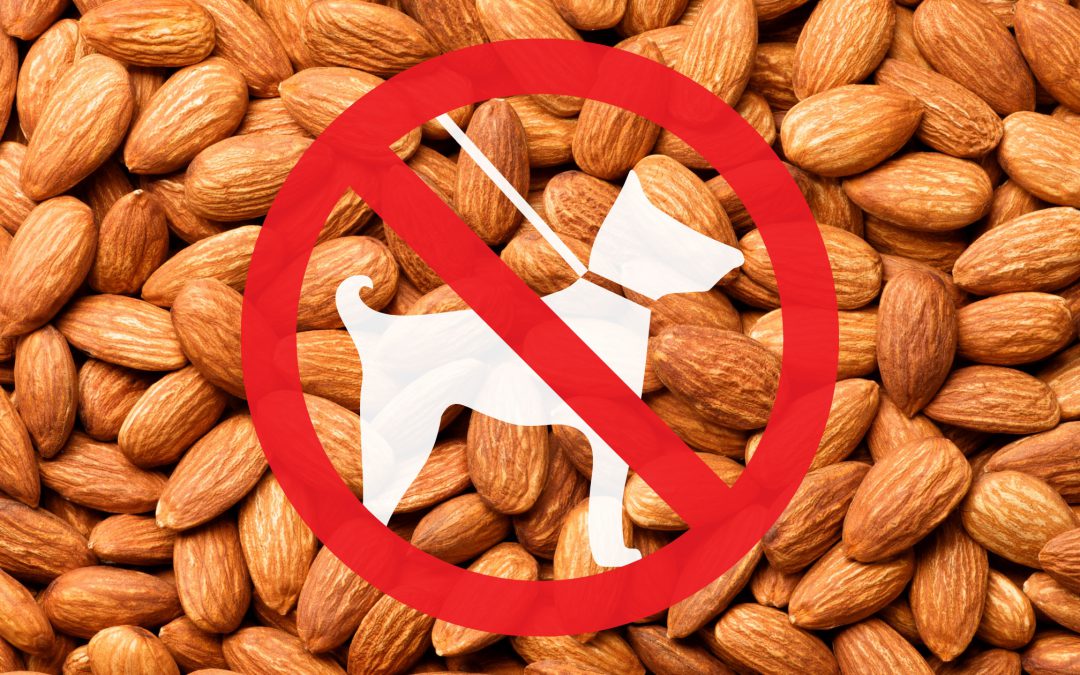Pet owners often wonder about safe dietary options for their dogs, particularly when it comes to human foods like nuts. Almonds are popular for their health benefits in humans, and it might seem like a tempting treat to share with your canine friend. However, it’s crucial to understand the potential risks and considerations before introducing any new food to your dog’s diet.
4 reasons why almonds are risky for dogs
1. Digestive Issues: Almonds are not toxic to dogs like some other nuts are, but they are difficult for dogs to digest. This can lead to gastrointestinal discomfort and symptoms such as upset stomach, gas, and diarrhea.
2. Choking Hazard: The size and shape of almonds pose a choking risk, especially for smaller dogs. They can also cause an obstruction in the gastrointestinal tract, which could require surgical intervention.
3. High Fat Content: Almonds contain high fats that can cause pancreatitis in dogs, a serious and potentially life-threatening condition. Pancreatitis results from the inflammation of the pancreas and can lead to symptoms like vomiting, stomach pain, and lethargy.
4. Salt and Seasonings: Almonds sold in stores are often salted or seasoned. Ingestion of salted almonds can lead to water retention and salt toxicity, while other seasonings may contain ingredients like onion or garlic powder, which are toxic to dogs.
Statistical insights and expert opinions
Veterinarians and pet nutrition experts consistently warn against feeding dogs almonds. According to a study published by the Pet Food Manufacturers Association, approximately 10% of emergency vet visits are due to the ingestion of inappropriate foods, with nuts prominently featured on the list of risky foods.
According to the American Kennel Club (AKC), “almonds aren’t deemed safe for dogs to consume. While they are not toxic like macadamias and some other nut types, they still present several health hazards to dogs.”

Safer alternatives to almonds
Given the risks associated with feeding almonds to dogs, consider these safer alternatives:
- Carrots: Low in calories and high in fiber and vitamins, carrots are a crunchy, satisfying treat for dogs. They are also good for your dog’s teeth.
- Apples: Without the seeds and core, apples are a healthy snack for dogs, providing vitamin C, fiber, and calcium. They also help to clean residue off a dog’s teeth, which aids in freshening breath.
- Pumpkin Seeds: Cooked, unsalted pumpkin seeds are a safe option if you want to give your dog a nutty treat. They’re rich in antioxidants and fatty acids, which are beneficial for a dog’s skin and coat health.
Step-by-step guide to introducing new snacks
1. Consult Your Vet: Always discuss any new additions to your dog’s diet with your veterinarian, especially if your dog has a history of digestive issues or allergies.
2. Start Small: Introduce any new treat in small amounts to see how your dog reacts.
3. Monitor Closely: Keep an eye on your dog for any signs of discomfort or illness. If you notice unusual symptoms, discontinue the new food and consult your vet.
4. Maintain a Balanced Diet: To avoid nutritional imbalances, treats should not make up more than 10% of your dog’s daily caloric intake.
Good boys get doggy treats, not almonds.
While almonds are nutritious for humans, they pose several health risks to dogs. By choosing safer, dog-friendly alternatives and following the right steps to introduce new treats, you can ensure that your pet enjoys a healthy and varied diet without unnecessary risks.


